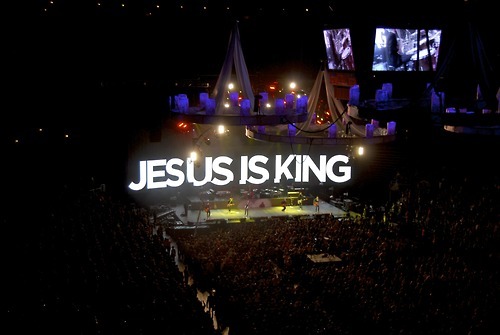adventures-from-fiction asked a question:
Can you talk a little bit more about the pentecostal church and how it works in Asian communities and even other ones? Because I really find that stuff super useful and important to know, and I dont know very much about it at all.
Hey dear friend! You’re referring to this post.
As far as I know, the Pentecostal or “Charismatic” movement (I’m using these terms interchangeably, though I understand that one is a denomination and the other is a tradition) has been a huge part of churches in the last two or three decades, though it’s actually been a part of first century Christians, too. I think it appeals to Asian, Eastern, and third world communities because the spiritual/transcendent aspect of faith is more emphasized, such as communing with the Spirit, getting visions, interpreting dreams, gifts of healing, and exuberant praise.
While I know that we can get carried away with these things, the Bible is pretty clear that believers are meant to have a full spectrum of faith that covers both intellectual and metaphysical elements. God is always trying to make us more human, and that means we grasp the entire range of the spiritual experience in all its glory.
I think Westerners are really afraid of this because it seems “irrational” or easy to fake, but the danger is that Westerners have gone so far to the other extreme that there is no room for miracles, personal experience, or meditation. Instead, it’s about doctrinal camps and right head-knowledge and church methodology, which are absolutely antithetical to what Jesus died for.
Again, I understand the Western fear, because Charismatic practices have been abused and can look strange. But when faith is only intellectual, then it’s actually asking for less of God and not more.
The Charismatic movement is important because it adds one more entry way into a multi-faceted Christian faith. It’s no longer monopolized by one type of Ameri-Euro-Christian. The Asian community outside of America cannot be reached by purely intellectual means; it must be deeper and wider. In other words, if I only teach doctrine or give out pamphlets, this won’t make sense in the worldview of an Asian who has largely lived by praying to his ancestors or chanting with shrines. But Asians do understand the spiritual realm, that there is “another world,” that there is a higher kind of consciousness, even though they also believe it’s impossible to understand.
Christianity says you can comprehend the spiritual through the person and work of Jesus. It’s by the entry point of the spiritual realm that then the Asian can come to know doctrine, but usually it’s not the other way around.
It’s the same way for Africans and Indians. Instead of imperialistically turning them into a “Westernized Christian,” the true Christian faith will respect an African’s and Indian’s heritage of spiritual/transcendent beliefs, while also giving the truth of Jesus. In other words, the Asian, African, and Indian become more fully Asian, African, and Indian, both respecting their traditions while enlarging them. (To be absolutely clear, this is not a polemic about race.) This is why the Christian faith can so easily migrate between nations and cultures and tribes, and is perhaps one of the only major religions in the world that has done so.
And of course, such parameters as social justice and doctrinal correctness can’t be the peaks of certain communities. Both Reformed and Emergent churches in the West don’t even begin to touch on the global spiritual needs of the East. If you bring any of the points we argue for in Westernized churches to a poor, rundown, third world church, they wouldn’t even care. The “peaks” of Westernized faith, while important, are not the only ones. There’s more to the conversation than our familiar brands of faith, and we need that dialogue. We need the same spirit of Jesus, who met people in their culture, and didn’t dismiss them, but enriched them.
— J.S.


I liked this J.S. As a Pentecostal Pastor I am always trying to walk the line of Word and the Spirit. A balanced Pentecostal theology depends on both the Word of God and the experience with the Spirit of God. My lead pastor reminds our congregation all the time if you have only the Word of God and no Spirit of God you will dry up and if you have only the Spirit of God and no Word of God you will blow up.
LikeLiked by 1 person
Dry up or blow up, I love it. Thank you always for your compelling thoughts!
LikeLike
Hi J.S.
There are many Charismatic movements here where I am from and I am not that much familiar with them, so thanks for covering them for us.
I believe as long as the Word of God is preached correctly, no matter who the preacher is, then it’s awesome, as Paul said in the Bible.
God bless you!
Luna
LikeLike
Thank you Luna. Right on, the Bible is the grounding force of every church, in the midst of so many traditions and movements.
LikeLike
Reblogged this on yahweh nature and commented:
Very important!
LikeLike
Thanks for a well-thought out post. Pentecostalism and charismatism has been misunderstood by many for a long time. A truly universal church encompasses a larger spiritual worldview that includes what charismatics have.
LikeLike
Absolutely, Kevin. I can understand the trepidation about the Pentecostal/Charismatic tradition, but to throw it out is very short-sighted.
LikeLike
Thanks for this post! I am of European descent and come from a very different Christian tradition, so it was great to see your perspective on what the charismatic tradition has to offer from a cultural perspective.
LikeLike
I hope you’ll share your experience as an European Christian one day! Would love to hear about it and to take note of the differences.
LikeLike
Thanks for the insightful post JS. I am planning to make a trip to Azusa Street sometime next week.
LikeLike